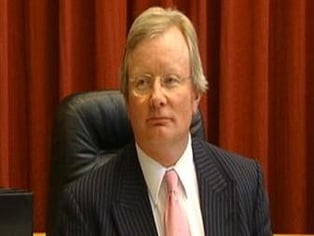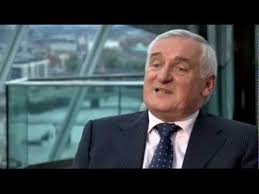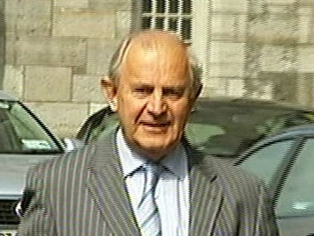Bertie Ahern failed to account for €198,000, paid to him
Pauric Flynn “utilised £50,000 (€60,300) ‘Gilmartin’s money for his own benefit’ Mahon finds

The Mahon tribunal has rejected much of the sworn evidence given to it by former taoiseach Bertie Ahern and said that he failed to “truthfully account” for the source of lodgements made to his bank account.
In its final report, published this morning, the planning tribunal found that Mr Ahern failed to account for over IR£165,000 (€198,00) which passed through bank accounts connected to him in the early and mid-1990s.
The tribunal states that: “Much of the explanation provided by Mr Ahern as to the source of the substantial funds identified and inquired into in the course of the tribunal’s public hearings was deemed by the tribunal to be untrue.”
However, it says that because Mr Ahern did not give a true account as to the source of money lodged to his accounts, the tribunal has not been able to identify where the money came from. For this reason, it could not determine whether Mr Ahern had received corrupt payments from the developer Owen O’Callaghan.
The report says that while the tribunal was inquiring into matters relating to Mr Ahern in the 2007/08 period, it “came under sustained and virulent attack from a number of senior government ministers who questioned, inter alia, the legality of its inquiries as well as the integrity of its members”.
“There appears little doubt that the objective of these extraordinary and unprecedented attacks on the tribunal was to undermine the efficient conduct of the tribunal’s inquiries, erode its independence and collapse its inquiry into that individual,” it continued.
A spokesman for Mr Ahern said: “Mr Bertie Ahern is reviewing the final report of the Mahon tribunal and will issue a statement in due course.”
Regarding Fianna Fáil, the tribunal states that the concept of senior government figures and ministers seeking financial contributions from businessmen who were in turn lobbying government to support various commercial projects was entirely inappropriate, and represented “an abuse of political power and government authority”.
Fianna Fáil leader Micheál Martin said senior party members would meet tonight to consider the findings before it issued a full response. He said the report should be referred to the Director of Public Prosecutions. Fianna Fáil TD Dara Calleary said he was “disappointed” and “betrayed” by the content of the report but he declined to comment on specific findings.
The Government is to refer the report to the Garda Commissioner, the Director of Public Proescutions, the Revenue Commissioners and to the Standards in Public Office Commission.
A three-day Dáil debate on the report will take place next week.
The tribunal found that former minister and EU commissioner Pádraig Flynn “wrongfully and corruptly sought a substantial donation” from developer Tom Gilmartin for Fianna Fáil. Having been paid IR£50,000 (€60,300) by Mr Gilmartin for that purpose, Mr Flynn proceeded to “utilise the money for his personal benefit”, the report states.
The report says Mr Gilmartin was acting under duress or had been coerced into make the donation and that he felt he had no choice in order to stop elected representatives obstructing his plan for a major shopping centre in west Dublin, now known as Liffey Valley and as Quarryvale in the late 1980s.
Part of the IR£50,000 was used to buy a farm in Cloonanass, Co Mayo, in the name of Mr Flynn‘s wife Dorothy, the report said.
The tribunal found that former Fianna Fáil deputy Liam Lawlor abused his role as an elected public representative (in his capacity as a councillor until June 1991 and as an elected TD representing the constituency of Dublin West until 2002) to a “very significant degree.” Mr Lawlor died in a car crash in Russia in 2005.
“Mr Lawlor, while an elected public representative, conducted a personal business in the course of which he corruptly sold his expertise, knowledge and influence as a councillor and as a TD for personal financial reward,” the tribunal concluded. “Mr Lawlor’s demands for payments, and his acceptance of money in these circumstances were enitrely inappropriate and were corrupt.”
The tribunal said it was satisfied that complaints made to the Garda by Mr Gilmartin during a 1989 corruption investigation about Liam Lawlor, former assistant county manager George Redmond and Cllr Finbarr Hanrahan were not “thoroughly investigated”.
The tribunal said it was satisfied that a call to Mr Gilmartin from a person who identified himself as “Garda Burns” were designed to intimidate and warn him off the path he had embarked on in making complaints about planning practices.
Mr Lawlor’s position as a TD was a likely reason why he was not interviewed by the Garda, the tribunal said, but it added that it was puzzled as to why the Garda went to such lengths to exonerate Mr Lawlor and Mr Redmond.
The long-awaited final report of the Mahon tribunal, the State’s longest running corruption inquiry, was published today, 15 years after its establishment and with costs estimated at over €250 million. Judge Alan Mahon was not obliged to give concerned parties advance copies of the report or to give advance warning of publication.
The tribunal was set up by Mr Ahern’s Fianna Fáil government in 1997 to investigate allegations of corruption and to herald a new era in politics. The former taoiseach has always denied taking payment for a political favour. The inquiry was originally sparked by cash for votes accusations in Dublin councils in the early 1990s which spread to include well known members of Fianna Fáil.
Allegations centred on the bribing of councillors for the re-zoning of large swathes of land around the capital from low value greenfield to lucrative commercial or residential sites.
The Tribunal of Inquiry into Certain Planning Matters and Payments, to give it official title, was established by minister for the environment and local government, Noel Dempsey in November 1997, and has held 917 days of public hearings with 400 witnesses.
Its initial remit was to inquire into the planning history and ownership of 726 acres of land in north Dublin and to investigate any payments to politicians or officials in connection with its rezoning.
Its terms of reference were soon expanded to allow for the investigation of all suspect payments to politicians and local authority officials in connection with a spate of re-zonings in Dublin.
In its introduction the report suggests that corruption continued at length in the planning system because it “affected every level of Irish political life” and that “those with the power to stop it were frequently implicated in it”. It also says the apathy on the part of the public towards corruption meant that there was insufficient pressure to compel public representatives to take firm action to curtail it.
Among the recommendations included in the report is that the amount of power placed in the hands of the minister for the environment when it comes to the planning process be reduced. It says that recent changes to planning regulations have resulted in an over-centralisation of power and it recommends that the minister’s power to give direction to regional and local planning authorities be entrusted to a planning regulator.
The report also expresses concern that existing measures around conflicts of interest do not sufficiently identify or regulate some such conflicts. It says that the system of disclosure of interests on an annual basis is not sufficient as significant time may elapse between a person becoming a public official and disclosing their interests.
Three high-profile figures – former minister Ray Burke, Mr Redmond and lobbyist Frank Dunlop – were found by the tribunal to have either arranged or accepted payments, while the late Liam Lawlor was jailed for non co-operation.
A list of unexplained lodgements to the accounts of Bertie Ahern



Judge Alan Mahon did not accept Bertie Ahern`s explanation for the source of any of these monies which came in old Irish punts, sterling and US dollars.
Here is a breakdown of each lodgement including dates, banks and original sums.
- IR£22,500, December 30, 1993 – cash into Bertie Ahern`s Allied Irish Banks Special Savings Account.
- IR£30,000, April 25, 1994 – cash into AIB.
- IR£20,000, August 8, 1994 – cash into AIB.
- UK£25,000, October 11, 1994 – cash into AIB. Mr Ahearn claimed it came from IR£16,500 in a whip-round from friends and UK£8,000 from a Manchester business dinner, equalling IR£24,838.49.
- $45,000, December 5, 1994 – lodged into former girlfriend Celia Larkin`s AIB account. The precise lodgement was IR£28,772.90 which Mr Ahern said was UK£30,000.
- Stg£10,000 and IR£2,000, June 15, 1995 – paid into Ms Larkin`s AIB account. The precise lodgement was IR£9,743.74 plus the IR£2,000.
- Stg£20,000, December 1, 1995 – paid into Mr Ahern`s AIB account. It converted to IR£19,142.92.
- Stg£15,500, over seven months in 1994 – paid into Mr Ahern`s Irish Permanent Building Society account and an account in the same bank in his daughter Cecelia and Georgina`s name.
- IR£20,000, October 26, 1994 – cashed to the B/T account in Irish Permanent. Originally in sterling.
- IR£20,000, August 25, 1992 – a cheque lodged in the B/T account.
- IR£10,000, July 18, 1995 – cashed to the B/T account.
- IR£54,000 which Mr Ahern claimed he amassed between 1987 and 1993 by saving cash.
A list of unexplained lodgements to the accounts of Bertie Ahern
Judge Alan Mahon did not accept Bertie Ahern`s explanation for the source of any of these monies which came in old Irish punts, sterling and US dollars.
Here is a breakdown of each lodgement including dates, banks and original sums.
- IR£22,500, December 30, 1993 – cash into Bertie Ahern`s Allied Irish Banks Special Savings Account.
- IR£30,000, April 25, 1994 – cash into AIB.
- IR£20,000, August 8, 1994 – cash into AIB.
- UK£25,000, October 11, 1994 – cash into AIB. Mr Ahearn claimed it came from IR£16,500 in a whip-round from friends and UK£8,000 from a Manchester business dinner, equalling IR£24,838.49.
- $45,000, December 5, 1994 – lodged into former girlfriend Celia Larkin`s AIB account. The precise lodgement was IR£28,772.90 which Mr Ahern said was UK£30,000.
- Stg£10,000 and IR£2,000, June 15, 1995 – paid into Ms Larkin`s AIB account. The precise lodgement was IR£9,743.74 plus the IR£2,000.
- Stg£20,000, December 1, 1995 – paid into Mr Ahern`s AIB account. It converted to IR£19,142.92.
- Stg£15,500, over seven months in 1994 – paid into Mr Ahern`s Irish Permanent Building Society account and an account in the same bank in his daughter Cecelia and Georgina`s name.
- IR£20,000, October 26, 1994 – cashed to the B/T account in Irish Permanent. Originally in sterling.
- IR£20,000, August 25, 1992 – a cheque lodged in the B/T account.
- IR£10,000, July 18, 1995 – cashed to the B/T account.
The Mahon tribunal today published its findings on a series of key people in its investigation into allegations of planning corruption.
Below are the findings on some of those key personalities:
TOM GILMARTIN:
 Sligo-born developer Tom Gilmartin gave evidence to the planning tribunal “in the honest belief that such evidence was true and accurate”, its report has said.
Sligo-born developer Tom Gilmartin gave evidence to the planning tribunal “in the honest belief that such evidence was true and accurate”, its report has said.
 Sligo-born developer Tom Gilmartin gave evidence to the planning tribunal “in the honest belief that such evidence was true and accurate”, its report has said.
Sligo-born developer Tom Gilmartin gave evidence to the planning tribunal “in the honest belief that such evidence was true and accurate”, its report has said.
It upheld many of the allegations made by Mr Gilmartin including that the late Liam Lawlor asked him for IR£100,000 and a 20 per cent stake in his business, and that Cork developer Owen O’Callaghan told Mr Gilmartin he made payments totalling IR£80,000 to former taoiseach Bertie Ahern.
It also accepted that former minister Padraig Flynn received IR£50,000 from Mr Gilmartin in April 1989 to “ease or remove obstacles” in relation to one of Mr Gilmartin’s planning developments.
The decision to make the payment was “misconceived and entirely inappropriate” but the tribunal accepted circumstances included “an element of duress or coercion”. And it believed Mr Gilmartin intended the cheque for Fianna Fáil. - Fiona Gartland
FRANK DUNLOP:
Of this figure, the tribunal found Mr Dunlop made corrupt payments of up to £170,000 to politicians to interfere with the planning process.
However, significant sums of cash remain unaccounted for.
These payments were made on behalf of property developer Owen O’Callaghan to secure councillors’ support for the rezoning of lands at Quarryvale.
Despite his statements to the contrary, the tribunal found Mr Dunlop sought to “actively and purposefully mislead” the tribunal, particularly in relation to his contention that Mr O’Callaghan was unaware of his corrupt activity. - Carl O’Brien
PÁDRAIG FLYNN:
Part of the IR£50,000 was used to buy a farm in Cloonanass, Co Mayo, in the name of Mr Flynn’s wife Dorothy, the report said.
The report says Mr Gilmartin was acting under duress or had been coerced into make the donation and that he felt he had no choice in order to stop elected representatives obstructing his plan for a major shopping centre in west Dublin, now known as Liffey Valley, in the late 1980s. - Steven Carroll
ALBERT REYNOLDS:
At that time, Mr O’Callaghan had been lobbying at Government level for support for a stadium project in Neilstown, Dublin.
On a separate issue, the tribunal said it was satisfied that Mr Reynolds did not receive a £150,000 payment from Mr O’Callaghan in 1994, or on any other occasion. The tribunal also found no evidence that Mr Reynolds had received a £40,000 payment from Mr O’Callaghan in connection with the Golden Island shopping centre development in Athlone.
The tribunal also found no evidence to support a claim that, following a fundraising trip to the US by Mr Reynolds, only a portion of the funds were lodged in the Fianna Fáil account. It had been claimed that the remainder was lodged in offshore accounts in the Dutch Antilles and Liechtenstein.
The tribunal also accepted that Mr Gilmartin suspected that Mr Reynolds had played a role in his difficulties with the UK Revenue, or in leaking it to the media, but said it heard no evidence to suggest this was true.
Nor did it find evidence that Mr Reynolds had blocked tax designation to the Blanchardstown Town Centre project. - Alison Healy
OWEN O’CALLAGHAN:
 The tribunal found Cork-based developer Owen O’Callaghan personally made or authorised corrupt payments totalling almost £120,000 to politicians for their support.
The tribunal found Cork-based developer Owen O’Callaghan personally made or authorised corrupt payments totalling almost £120,000 to politicians for their support.
The tribunal did not accept that Mr O’Callaghan was unaware of the “corrupt” activity of former Fianna Fail lobbyist Frank Dunlop in paying councillors to support the rezoning of Mr O’Callaghan’s development at Quarryvale.
It said Mr O’Callaghan paid money to the late councillor Sean Gilbride, and former councillors GV Wright, John O’Halloran and Colm McGrath to ensure “their continued support and assistance” for the rezoning of Quarryvale between 1992 and 1993.
He also paid the late Liam Lawlor, who was a TD and a councillor, IR£41,000 between 1991 and 1996.
In a statement this afternoon, Mr O’Callaghan said he “utterly” rejects the findings of tribunal and intends to seek their judicial review in the High Court. “The tribunal arrived at its conclusions based on procedures which by any reasonable criteria have been biased, unfair and unjust,” he said. - Fiona Gartland
LIAM LAWLOR: RIP
“Mr Lawlor, while an elected public representative, conducted a personal business in the course of which he corruptly sold his expertise, knowledge and influence as a councillor and as a TD for personal financial reward,” the tribunal concluded. “Mr Lawlor’s demands for payments, and his acceptance of money in these circumstances were enitrely inappropriate and were corrupt.”
The tribunal said it was satisfied that complaints made to the Garda by Mr Gilmartin during a 1989 corruption investigation about Lawlor, former assistant county manager George Redmond and Cllr Finbarr Hanrahan were not “thoroughly investigated”.
No comments:
Post a Comment